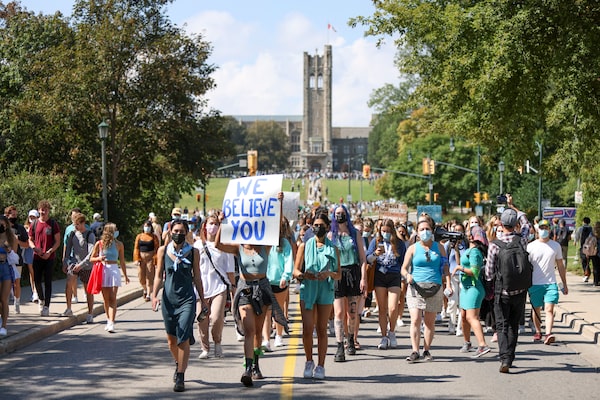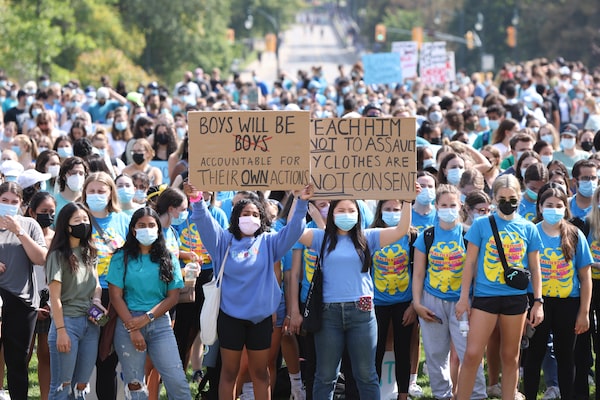
Western University students march during a walkout in support of sexual assault survivors in London, Ont., on Sept. 17, 2021.Nicole Osborne/The Canadian Press
Thousands of students walked out of classes at the University of Western Ontario Friday to protest recent incidents of sexual violence and a campus culture that they say endangers students.
The crowd on the university lawn in London, Ont., was estimated at more than 10,000. They stood in the sun for more than two hours listening to speeches, including from survivors of sexual assault.
Asia Walczak, a fourth-year history student, was among those in the crowd Friday. She said she hopes the massive student turnout sends a message that Western needs to undergo a culture shift.
“You speak to anybody here, they either personally have been – or know someone who has been – assaulted or harassed,” Ms. Walczak said.
The walkout comes less than a week after allegations emerged on social media that several students in Western’s Medway-Sydenham Hall residence were drugged and some sexually assaulted in the final days of orientation week. London police launched an investigation into the reports, but say they’ve so far received no information. Separately, police received four sexual assault complaints involving Western students not connected to the residence, which resulted in one arrest and no charges, although investigations continue.
“It’s unfortunate that something like what’s happened this weekend and this past couple of weeks had to be something that forces our hand,” Ms. Walczak said. “But it is time to have a change of how we deal with sexual assault and how we prevent it.”
One of the speakers was Teigan Elliott, a student leader and a member of the Red Zone Research Team, which researches sexual violence during the first few months of university, a time of acute risk.
“There is a problem at Western that is not going away,” Ms. Elliott told the crowd. “Western, there are no excuses left for you. Your students are not safe here. You’re putting them in danger, and we should not have to be here protesting for our basic human rights.”
Western president Alan Shepard was among the crowd, but did not speak at the event. Earlier this week, Dr. Shepard said the university has a culture problem that it needs to address. He stressed that university is not the giant party that some seem to think it is, particularly in the first weeks of term. He announced stepped-up security patrols, more campus policing and mandatory training for all students in residence on sexual violence and consent. The training is expected to begin next week and will eventually be mandatory for all students, the university said.
Angela Van Damme, the mother of a first-year student at Western, wrote to Dr. Shepard about what she called the university’s “pervasive culture of toxic masculinity.”

Western University students demonstrate during a walkout in support of sexual assault survivors, in London, Ont., Friday, Sept. 17, 2021.Nicole Osborne/The Canadian Press
Ms. Van Damme didn’t attend the demonstration, but applauded the leadership shown by students, which she contrasted with what she called the lagging approach of university administrators. She said trust has been broken in the institution and needs to be restored. She pointed to specific steps the university could take to make reporting of sexual violence easier and clearer, the need for better supervision from upper-year students in residence, and for signage reminding students of their responsibilities to one another.
“What I’m so disappointed about it is this sort of bureaucratic response and deflection of responsibility,” Ms. Van Damme said. The university is trying to change the narrative by coming out in support of the student walkout, she said, but needs to do more to address their concerns. She said she has paid thousands of dollars to the university, some of it specifically for student life and student safety, and added that if the university sees itself as a business, it should recognize the product it’s selling is defective.
A group of more than 25 students from Western and its affiliate colleges organized the walkout. Their aim was to show support for survivors and to demand the university take steps to protect students from sexual assault.
Ian Rae, a literature professor at King’s University College, was one of many faculty members in attendance to show their support.
“[I] hear students are concerned – they’re scared, they’re justifiably angry.” Prof. Rae said. “My impression is they’re much farther ahead on this in activism and information-gathering than the administration.”
The crowd also held a moment of silence for first-year student Gabriel Neil, who died last week after being violently assaulted near campus. A small memorial has been set up at the major intersection of Western Road and Sarnia Road, where Mr. Neil was attacked.
Our Morning Update and Evening Update newsletters are written by Globe editors, giving you a concise summary of the day’s most important headlines. Sign up today.